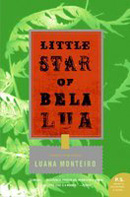

Harper Perennial, paperback, 9780060899530
A set of loosely connected short stories, this colorful collection by Brazilian author Luana Monteiro pulses with mystery and magic, all the while presenting a convincingly realistic world. When the back cover promised me tales of a miraculous fish in the desert, a river spirit, and a young woman possessed by a "lustful earth goddess," I expected that I would be labeling the book as "magic realism." But after reading the book, I shy away from using the term; the "magic" in this book is a kind of matter-of-fact acceptance of the supernatural, of religious and spiritual mysticism, that is so intertwined with reality that one can hardly separate the magic from the real. At the same time, most of the "supernatural" occurrences have a clear metaphorical or psychological meaning—the miraculous fish in the desert appears, after a nine-month drought, to an old woman who has long wished in vain for a child; the river spirit's melody that fills the priest's head can be interpreted as a literal result of physical poisoning, or the metaphorical portrayal of the call of primal, worldly desires. Still, one comes away from the stories feeling that maybe, just maybe….
Because these supernatural elements are handled with a light touch and integrated into a realistic world, the stories do not suffer from the usual problem I find in magic realist literature: flat, unbelievable characters. Instead, the characters come across as satisfactorily authentic, and they grow and change. Their inner struggles are understandable, be it an old woman’s wish for a child long after her time had already passed, or a young woman's desperate prayers for help with her uncontrollable desires, or even an apparently immortal man's wish for death. I was particularly fond of the protagonist in the title story, "Little Star of Bela Lua," a young traveling troubadour of sorts, a repentista—a (gasp!) female repentista. What woman wouldn't cheer for her as she "duels" with male rhymesters, forging her own path despite the prejudices of men and even some women, and the disapproval of her own family?
Monteiro paints her settings well—we imagine the dry, dusty heat of the desert; the lush, green canopy
of the jungle; the sights and sounds of urban Recife. The imagery and descriptive passages deepen the
atmosphere of the book without overwhelming the narrative. Lovely and subtly quirky images abound: describing
the jungle, Monteiro writes, "From time to time a rent in the mist revealed the shapes of giant pachydermic
trees, their leaves dripping slowly onto the brown water." This subtle quirkiness blends well into the
overall texture of this refreshingly offbeat collection.
